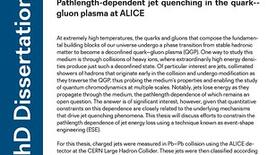At extremely high temperatures, the quarks and gluons that compose the fundamental building blocks of our universe undergo a phase transition from stable hadronic matter to become a deconfined quark–gluon plasma (QGP). One way to study this medium is through collisions of heavy ions, where extraordinarily high energy densities produce just such a deconfined state. Of particular interest are jets, collimated showers of hadrons that originate early in the collision and undergo modification as they traverse the QGP, thus probing the medium’s properties and enabling the study of quantum chromodynamics at multiple scales. Notably, jets lose energy as they propagate through the medium, the pathlength dependence of which remains an open question. The answer is of significant interest, however, given that quantitative constraints on this dependence are closely related to the underlying mechanisms that drive jet quenching phenomena. This thesis will discuss efforts to constrain the pathlength dependence of jet energy loss using a technique known as event-shape engineering (ESE).
For this thesis, charged jets were measured in Pb–Pb collision using the ALICE detector at the CERN Large Hadron Collider. These jets were then classified according to their angle with respect to the event plane, as well as the shape of the event that they traversed. No sensitivity of the jet spectra to the event shape was observed; however, the yields were seen to be dependent on the event-plane angle. Moreover, this dependence was stronger for highly-elliptical events and weaker for highly-isotropic events. Such results are consistent with descriptions of pathlength distributions that were studied in Trajectum and the assumption that jets lose energy in a pathlength-dependent manner. Further theoretical models are required to extract quantitative constraints from this study.
Thesis Advisor: John Harris (john.harris@yale.edu)

Dissertation Defense: Caitie Beattie, Yale University, “Pathlength-dependent jet quenching in the quark–gluon plasma at ALICE”
Event time:
Tuesday, March 7, 2023 - 10:00am to 11:00am
Location:
Wright Lab, WL-216 (Conference Room)
272 Whitney Avenue
New Haven, CT
06511
Speaker/Performer:
Caitie Beattie, Yale University
Admission:
Free
Event description:
Contact:
(see "Description" above)

